Conference Report
The AMED-RISTEX Healthy Ageing Symposium
The ‘AMED-RISTEX Healthy Ageing Symposium’ was held at the Nihonbashi Life Science Hub on the 26th and 27th February 2018, co-hosted by the AMED London Office, RISTEX and LINK-J, and with the support of the British Embassy Tokyo.
This is the second Healthy Ageing Symposium, following on from the first event held in London on the 12th April 2017. Based on the outcomes of discussions held at that first event, this Symposium focused in particular on the topics of health promotion, disease prevention and disease management. The specific theme of the first day was ‘Development and evaluation of digital health interventions’ whilst that of the second day was ‘How research can have impacts in society: perspectives from health longevity and disease prevention’. There were eight presentations and two panel discussions held over the course of two days, with speakers comprising Japanese and UK researchers, as well as representatives of local governments.
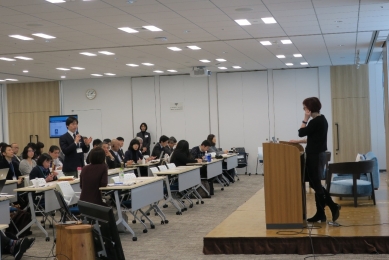 The meeting venue at the Nihonbashi Life Science Hub
The meeting venue at the Nihonbashi Life Science Hub
On the first day, Professor Susan Michie and Professor Robert West of University College London in the UK presented methods and exemplars for development and evaluation of digital health interventions borne of rapid technological advancement, and explained their associated challenges. Associate Professor Shinzue Masuki of Shinshu University then discussed the development and dissemination of a smartphone application for interval walking training, and Mr Kentaro Yamaguchi, Director-General of the Healthcare New Frontier Promotion Headquarters Office in Kanagawa Prefecture, introduced their various activities around the concept of ‘ME-BYO’ – our own ever-changing status on the continuum between good health and illness. The panel discussion that ended the day highlighted the importance of cooperation between academia and industry in the practical application of digital health approaches, and the necessity of user-engagement in data health and of responding to the needs of those who have difficulty in accessing new technologies, such as the elderly.
-
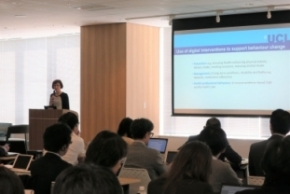 Professor Susan Michie’s presentation
Professor Susan Michie’s presentation
-
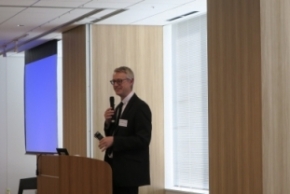 Professor Robert West’s presentation
Professor Robert West’s presentation
-
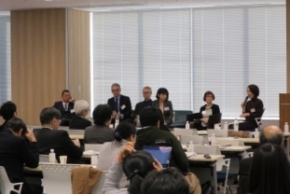 Panel Discussion
Panel Discussion
On the second day, Professor Robert West presented on the topic of optimising behaviour change interventions – drawing on the case of English Stop Smoking Services, and Professor Laurence Moore of the University of Glasgow explained about methods for process evaluation in research. Professor Katsunori Kondo of Chiba University then presented his work on the JAGES project and the necessity of design science in policy and services, and Dr Shoji Shinkai, Vice President of the Tokyo Metropolitan Institute of Gerontology, introduced initiatives for preventing frailty in cooperation with local government. The concluding panel discussion pointed out the importance of complex interventions addressing not just the individual, but also multiple layers, including the environment. The necessity to evaluate not only ‘what works’ in the study of interventions, but also ‘why it works’, and the involvement of various stakeholders from the initial research design stages were also highlighted.
-
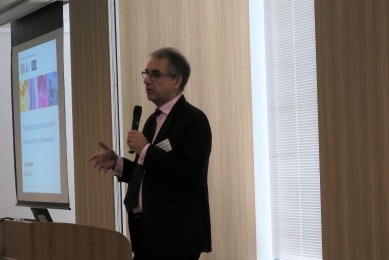 Professor Laurence Moore’s presentation
Professor Laurence Moore’s presentation
-
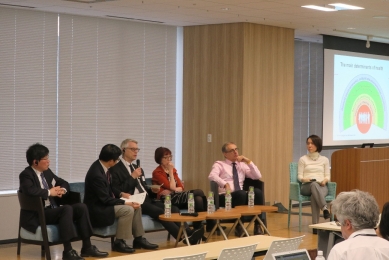 Panel Discussion
Panel Discussion
At the end of the Symposium, the contents of both days were summarised by Professor Akira Morita of Tsuda University. He discussed the importance of utilisation and monitoring of data collected in digital health initiatives, the value of targeting research at practical application and influencing policy rather than publishing papers, and stressed that while there is a tendency to pursue only the most highly specialised and accurate research, it is necessary to accept uncertainty and for science to ultimately benefit society.
The outcomes of this symposium will feed into future research support and strategic research planning by the AMED London Office, in consideration also of the latest global trends and perspectives of varied stakeholders from research, industry, health insurance, and local and national government sectors.
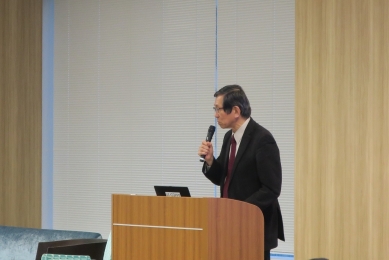 Professor Akira Morita’s speech
Professor Akira Morita’s speech








